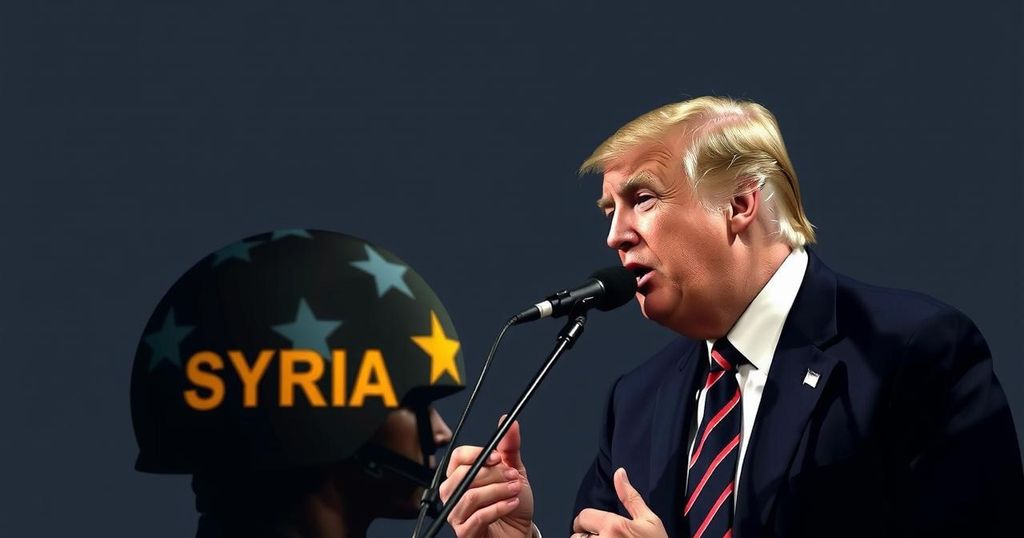Donald Trump has indicated a desire to withdraw U.S. troops from northern Syria to prevent them from being endangered in potential conflicts between Turkey and Kurdish fighters. In a discussion with Robert F. Kennedy Jr., Trump highlighted concerns over troop vulnerability and military assessments warning that American soldiers could become “cannon fodder”. His re-election raises questions about changes in U.S. foreign policy, particularly regarding the support of Kurdish forces and the fight against ISIS.
Donald Trump, in a recent conversation with Robert F. Kennedy Jr., expressed a desire to withdraw U.S. troops from northern Syria to avoid their potential role as “cannon fodder” amidst possible clashes between Turkish forces and Kurdish fighters. During a flight, Trump pointed out the geographical complexities, referencing troop placements and the geopolitical implications of escalating tensions in the region. Kennedy noted that Trump received alarming assessments from military leaders regarding the vulnerability of American forces if hostilities increased. Kennedy detailed that Trump had highlighted the significant troop presence in both Turkey and Syria and articulated the risk posed to U.S. personnel caught between opposing factions. As Trump was re-elected president, concerns have emerged regarding his potential shift in foreign policy, particularly regarding U.S. involvement in Syria and support for its allies. The United States has a longstanding commitment to supporting the Kurdish militias against extremist threats, complicating military withdrawal strategies and regional stability. Since 2014, the U.S. has backed the Syrian Democratic Forces and the Kurdish People’s Protection Units in their efforts against the Islamic State. However, Turkish objections to Kurdish autonomy, equating it with terrorism, have led to repeated military incursions. The Syrian government has also signaled intentions to reclaim lost territory, further escalating tensions in northern Syria while the fate of captured ISIS members remains a contentious issue among foreign governments regarding repatriation.
The context surrounding U.S. military involvement in Syria is deeply rooted in the complex interplay of regional conflicts and international alliances. Since the onset of the Syrian civil war in 2011, various factions have emerged, including Kurdish forces that have received U.S. backing to combat the Islamic State. Tensions with Turkey arise from the Turkish government’s view of the Kurdish groups as terrorists. As such, a U.S. withdrawal might have significant implications for security and stability in the region, as it could leave Kurdish forces vulnerable amid ongoing hostilities. Furthermore, there are concerns that diminished U.S. presence could embolden adversarial actions by both Turkey and the Assad regime.
In summary, President Donald Trump’s desire to withdraw U.S. troops from northern Syria underscores the complex geopolitical landscape and the risks posed to American forces in potential conflict scenarios. With pressing regional dynamics involving Turkish and Kurdish interests, as well as the ongoing threat of ISIS, a careful consideration of foreign policy is imperative. Trump’s recent statements reflect a significant shift that may redefine U.S. involvement in the Middle East and prompt concerns among allies regarding military commitments and support strategies.
Original Source: www.middleeasteye.net







